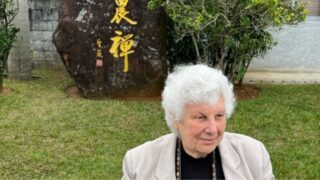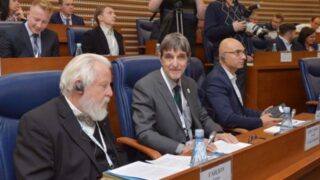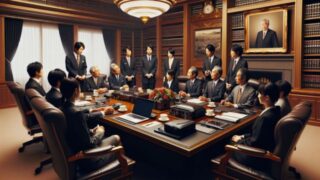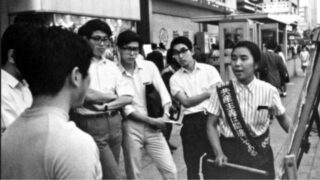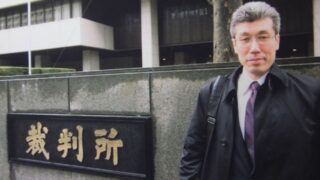The conversation with Reverend Nakagawa, President of Japan Christian Theological Institute, and Professor Tsutomu Nishioka from Tokyo Christian University continues, focusing on deprogramming and the devious tactics of anti-cult lawyers.
by Makiko Takita
Article 2 of 6. Read article 1.


Nakagawa: “The first and foremost of the hidden truths I would like to point out is that some former believers of the Unification Church have been victims of abductions and deprogramming under confinement. It has not been made clear that the National Federation of Bar Associations has been using such former believers—who were abducted and forcibly converted in confinement for many years—to develop court battles in pursuit of the church and its assets. This time, the issue of illegal abduction, forced confinement, and deprogramming of adult believers should not be ignored. The Agency for Cultural Affairs used as the basis for the dissolution request 128 of the 231 plaintiffs in the 22 civil lawsuit judgments (increased to 32 at the time of the request). These cases were the ones the Unification Church lost in court. These cases were also often these where the people suing the church had been forced to apostatize through the same kind of abduction and confinement tactics. We believe that this could violate Article 38 of the Constitution, which states, ‘No confession made under compulsion, torture, or intimidation, or after unreasonably long detention or imprisonment, shall be admissible as evidence.’ Some Christian church leaders and clergy were also involved in forced deprogramming. Some pastors helped parents who wanted to have their adult children deprogrammed by instructing them on the process of abduction and confinement. The instruction was given over a period of six months or a year before the confinement took place. Parents claim they tried to compel their abducted children to leave the church out of love. However, it is important to note that these ‘children’ were adults.”
Nishioka: “Yes. If they had been minors, there would have been room for the parents to intrude on their children’s beliefs based on their parental rights.”
Nakagawa: “But if adult believers do not want to give up their faith, and the parents insist that they should do it if they love them, the adult believers will typically not know what to do. Even if they leave the church because of deprogramming, they will most likely not sue the parents who abducted and confined them after their release. Even if they are abducted, confined and forcibly deprived of their faith, the adult believers will still accept that the parents did it out of love. However, this kind of crude method damages the parent-child relationship and leaves a big scar. Even if the adult believers say they are happy to have left the group, they may still be tormented by the memory of the moment of abduction and confinement, and a rift between parent and child may eventually develop, and the wound may never heal. They may not heal naturally but rather suffer from after-effects as if they were injected with something strange. Hate and hostility will be directed by parents and lawyers towards the church. Such methods, called deprogramming, now are in disuse and barely seen around the world. However, in Japan, deprogramming has continued. This is because the National Federation of Bar Associations has a well-established system of inducing deprogrammed believers to file lawsuits.”
Nishioka: “In terms of looking at this fairly, there is something I did not comment about enough earlier. That was the Declaration of Compliance issued by the Family Federation made in 2009, in which the church radically reformed its fundraising activities. After that, the number of new cases brought to court was only four, as I recall, and things have changed quite a bit.”


Nakagawa: “That’s right. Then, after 2015, when a judicial decision made deprogramming through abduction and confinement an illegal act, the lawyers and families could no longer use this method. Then, no more lawsuits were filed against the Family Federation for donations made in 2016 and after. On the surface, the lawyers and former believers say, ‘We were deceived by the Unification Church,’ and ‘The Unification Church is reprehensible,’ but behind the scenes, they pursue the Unification Church as plaintiffs in court by committing serious human rights violations and trampling on the dignity of individuals. But the system behind the scenes is hidden from the public, and the fact that even Christian pastors and lay leaders have been involved in these human rights violations is still not mentioned at all. Article 38 of the Constitution of Japan was originally intended to provide for due process in criminal proceedings, but the testimonies that come out of kidnappings and confinements also lack evidentiary value. Such a method is unacceptable in the first place. Furthermore, it is unthinkable that the National Federation of Bar Associations was asked to cooperate in the government investigation stage of a request for a dissolution order. As in the case of the Kishida administration, there is already a precedent in the U.K. of an attempt to dissolve a religious corporation through the concerted efforts of an ‘anti-cult’ organization/activists and the government. In 1984, the British government joined forces with anti-cult movements to eliminate the charitable status of the Unification Church, which is equivalent to Japan’s efforts to revoke its status as a religious corporation. The British government’s investigation relied almost entirely on the anti-cult groups, and deprogramming experts gathered testimonies from ex-members who had been forced to apostatize. But much of this information was exaggerated or disproven, and eventually the British government lost in court and had to pay the Unification Church $6 million, or about 850 million Japanese yen.
Also, in the U.S., there was an anti-cult network called CAN. They once worked to attack groups they identified as cults. However, they were sued for violations of the constitutional rights of the victims. The deprogramming methods that they used against believers were widely recognized as a threat to human rights, and CAN was forced to pay a large sum of money in compensation and went bankrupt. In the U.K. and the U.S., organizations that engage in deprogramming were recognized as dangerous, but in Japan, the government sought the cooperation of such groups and proceeded in a manner that relied on their ‘knowledge.’”
Nishioka: “That is one of the hidden truths. The government says that the three requirements for dissolution are organization, malignancy, and continuity, but I wonder how they see the transformation or improvement of the church after 2009. It seems to me that this is the major point of contention that determines continuity. [The three requirements mean that the church leaders must have ‘organized and participated’ in ‘malicious’ acts and are ‘continuing’ to commit these acts.] However, if you look at the ‘Asahi’ newspaper, it does not cover such changes as the 2009 Declaration of Compliance on the part of the Unification Church but only focuses on the National Federation of Bar Associations’ claims that complaints of damage have continued to surface even after 2009. The MEXT reported that it had interviewed former believers in depth to prove the continuity of the situation without much corroborating data from trials. In other words, the Ministry is interviewing former believers to find out the truth, but they are not interviewing current believers to check what their truth is. From the very beginning, the government procedure is based on the principle that ‘We will punish them’ or ‘We will crush them,’ and the news articles and broadcasts encourage this conclusion. So, not only are the standards for dissolution changing, but the civil servants in the government department that deals with religion are moving ahead with an order to dissolve. This persistence is frightening.”


Nishioka: “At this stage, I would ask: what kind of relationship did Reverend Nakagawa have with the Unification Church?”
Nakagawa: “As you [Nishioka] mentioned, the Unification Church from our theological point of view is unorthodox, so I have been watching it for twenty-five years. I have also attended meetings of the National Federation of Bar Associations. However, what was not clear to me was why there was a large gap between what I was told about the church by the National Federation of Bar Associations and what was said by ex-members who were not abducted and confined but left the church because they naturally lost their faith. It seems that if one person had a bad experience with the Family Federation, the lawyers would inflate or embellish that story and create ten or more vicious and extreme stories. It was such an uncomfortable feeling. So, without revealing my family name, I entered the Unification Church and went undercover to find out how the church operates and who they truly are. As I delved deeply into the inner workings of the church, what I found out through my own eyes was that the Unification Church had horizontal ties and bonds among its followers, and that there was a very good fellowship among them. The believers encourage each other and help each other to live their life of faith genuinely. I am a pastor in a Christian church. When I saw them, I thought to myself, ‘I can’t compete with this people.’ I can confidently conclude that there is too much delusion and prejudice about the Unification Church. The lawyers have created an image of the Unification Church that is terrible and scary, but that image is false. Now that the request for a dissolution order has been issued, they [the Family Federation] are really in trouble, but I don’t think it is such a bad church that it needs to be dissolved. Everything is different from my church, but they also have something they are entitled to protect. I know that from my experience. Many Christians hate the Unification Church, so when this situation started, emotionally I also thought, ‘Let it go down [and be dissolved].’ However, as a religious person, I criticized my own thoughts. I strongly believe that we need to look at it more fairly.”





